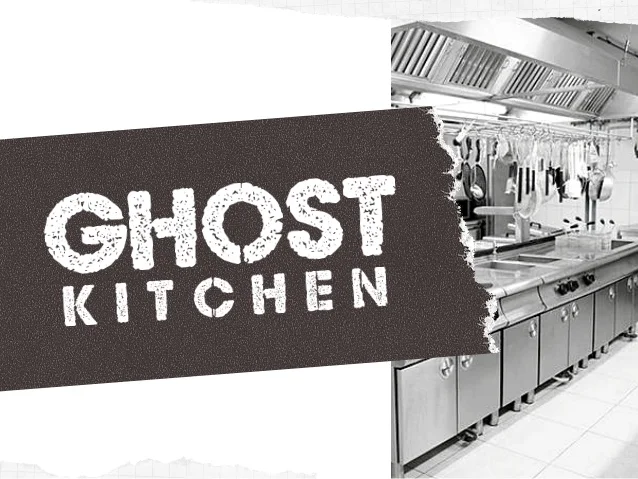
You might have noticed your favorite local restaurant has retained a skeleton kitchen staff pumping out your favorite dishes available for delivery-only through third-party services such as Uber Eats, DoorDash, GrubHub, Postmates, and Delivery Dudes. The Coronavirus (“COVID-19”) global health pandemic has rocked the restaurant industry and has turned most of our favorite restaurants into dark or virtual restaurants which have been given the moniker “ghost kitchen”. Ghost kitchens were gaining momentum before COVID-19, and, now with the shelter-in-place and stay-at-home governmental orders, most traditional restaurants that remain open have been effectively converted into ghost kitchens.
What are Ghost Kitchens?
Ghost kitchens are, more or less, a “WeWork” for restaurants in a particular locality. Ghost kitchens have no storefront and serve as a space for restaurants to prepare food and deliver it to customers. Multiple restaurants can operate out of the same ghost kitchen. Third-party delivery sites are littered with ghost kitchen operators amongst the options with traditional storefront restaurants, and the customer may not even know whether the food they are being served was made in a traditional restaurant or a ghost kitchen. In fact, DoorDash launched its own ghost kitchen called DoorDash Kitchens in Redwood City, California, which includes a mix of locally founded joints and national brands including The Halal Guys, Rooster & Rice, and Nation’s Giant Hambugers.
The benefits of a ghost kitchen are obvious and now being realized by traditional restauranteurs. Operating costs are drastically lower with a smaller footprint and less labor costs. Less labor means less headaches for many restaurant owners finding themselves in labor disputes and unemployment claims. Rent is a killer for many restaurants and not having to worry about that expense, but being able to put out your food to the consuming public, is enticing. With lower overhead, restauranteurs can take more risks with concepts and give new restaurants a chance to thrive. Without question, the lower initial investment to open in a ghost kitchen reduces the barrier to entry in the restaurant industry.
Socially Distant Consumer Experience
Ghost kitchens provide the flexibility for the public to order what they want and have it arrive on their doorstep. Before the COVID-19 pandemic, food delivery was growing at a rapid clip. Forbes has estimated that the food delivery industry is soon-to-be worth $200 billion. There has been a growing appetite from restaurant-goers to eat at home without having to deal with lines, waits, service issues, and other people. Many third party delivery companies have adopted “contact-less” delivery options during the pandemic which likely will be the future of delivery.
The pandemic’s social distance experiment will only serve to increase the number of consumers who try third party delivery. Restaurants that are looking into ghost kitchen options are banking that the majority of the public will keep mobile-ordering as part of their weekly routines.
Ghost Kitchen Investors are on the Prowl
Our attorneys represent numerous traditional restaurants and franchised restaurant concepts. The firm also represents a third party delivery company. What are we seeing relative to ghost kitchens?
Investors are on the search for up-and-coming brands with regional and national appeal to add to their ghost kitchens in markets that are not-yet served by the brand. The deal is pretty straightforward. The brand grants the ghost kitchen investor company the rights to use their intellectual property. In exchange, the ghost kitchen investor pays a license fee. The brand is generally in control of the menu and continued development of the brand. The brand is responsible for sourcing goods, training ghost kitchen staff, marketing the brand and providing accurate menu information. The two sides agree on locations where the ghost kitchen investor may roll-out the brand’s concept.
“Our pizza brand has been thriving regionally in the Southeast, and we have pending franchise deals in the Northeast,” said Drew Ciccarelli, owner of Stoner’s Pizza Joint. “The COVID-19 pandemic has forced us to pivot our stores into delivery-only operations. However, before the virus hit, we inked a deal to get our brand into 17 new markets immediately through ghost kitchens with the option to increase the market presence in other areas around the country that Stoner’s Pizza Joint or our franchisees are not located.”
The future is now for ghost kitchens, and the demand is being ramped up by 100% of the restaurant-going public being forced to eat at home during the COVID-19 pandemic. It is widely believed that the COVID-19 pandemic will change the restaurant industry permanently, and the number of ghost kitchens will be a part of that change. You might see shutdown small restaurants being replaced by virtual kitchens pumping out food for multiple brands and serving either pickup or delivery post-pandemic. This would be a win-win for reeling landlords. With low overhead costs, the ghost kitchen option could be a no-brainer for investors, franchise brands, third party delivery companies, landlords, entrepreneurs and traditional restauranteurs.
If you have any questions on expanding your brand through ghost kitchens or about ghost kitchens generally, please contact us at (561) 693-3234 and one of our attorneys will be available to speak with you.
About Wasch Raines LLP
Wasch Raines LLP is a franchise and business law firm providing a comprehensive range of services to emerging and established businesses and franchise companies in a variety of industries. Through its unique business model, the firm offers its clients the benefits of having a cost-efficient in-house general counsel and a full service litigation team.
Wasch Raines LLP has has provided this article for general informational purposes only. It is not intended as professional counsel and should not be used as such. You should contact your attorney to obtain advice with respect to any particular issue or problem.

